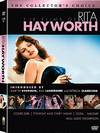





Teresa Wright
Biography | Filmography | Awards | Articles | Remembering | Bibliography | Gallery | News | Downloads | Links | Image Credits | THE LITTLE FOXES | MRS. MINIVER | SHADOW OF A DOUBT | THE PRIDE OF THE YANKEES | THE BEST YEARS OF OUR LIVES
| Article: |
A Fox No-one Could Snareby William RussellThe Herald (Glascow) August 20, 1996 page 15Teresa Wright's Hollywood career took off like the proverbial rocket. She got an Academy Award nomination for her first two films, and the award itself for her third, Mrs Miniver, in which she played Greer Garson's daughter [sic]. That first film was William Wyler's classic account of Lillian Hellman's Little Foxes, and although her career was to peter out she had other fine films to come, including Hitchcock's fine thriller, Shadow of a Doubt; The Men, in which Marlon Brando made his screen debut; and her own favourite, The Actress, in which she co-starred with Spencer Tracy and played Jean Simmons's mother, although she was at least 10 years too young in real life. She is in Edinburgh to give a Scene by Scene lecture tonight on Shadow of a Doubt, in which she played a small town girl fascinated by her handsome uncle (Joseph Cotton [sic]), who has come for a visit, only to discover he is a killer on the run and she is his next victim. Last night she introduced the screening of another Wyler film in which she appears, The Best Years of Our Lives. Small, delicate, with the warmest of smiles, she is still, half a century later, recognizably that young girl who became a star. She firmly rejects any suggestion Hitchcock treated actors like cattle, saying it had been a happy film to make. He was a considerate director who had everything planned and they remained friends for the rest of his life. But one wonders why, with a start like that and the co-stars she was given -- Gary Cooper, Fredric March among them -- her Hollywood career petered out. She might have become one of its grandes dames. In fact, she returned to the theatre, appearing frequently on Broadway and summer stock. Immediately after The Actress, in which she played someone a good 10 years older than she was with no make-up, she went on stage in Bell Book and Candle playing a glamorous role as the witch. "That was therapeutic." She says she made two mistakes. One got her sacked by Sam Goldwyn, to whom she was under contract, the other was to turn down a big money mediocre film, in favour of doing The Men, a 21-day shoot for $ 20,000, because she liked the script. "Hollywood understands dollars and cents," she says. "You are what you are paid, and it was my misfortune The Men came out when America was tired of war. Nobody wanted to see a film about paraplegic ex-servicemen." She became something of a heroine for standing up to Goldwyn after his publicity department demanded, a week or so before Christmas, that she go East on a publicity tour. "I did not like being pushed around," she says. She refused, saying they had given her no warning, she had a family -- two stepsons and a baby of her own -- to make Christmas preparations for. Then she decided she would try, started to rush her preparations, and fell ill. The studio demanded she see its doctor, she said her own was a reputable man. They could talk to him. She says now that Goldwyn, although difficult, was a fair man and she should have gone straight to him. "I did not do so, and that was not very bright of me," she adds. As a result she left the protective studio net and turned freelance. "I was this stupid little girl who left a wonderful producer to be free, but I made the correct choice, although in the business world it was not. I am appalled by the salaries paid film stars today. They obviously bring it in or they would not be paid so much, but someone else down the line, other actors or the script writer, is not getting paid as much as they should. It seems really unfair." On Broadway she has appeared in comedies like Chin Chin and serious drama like Ibsen's The Master Builder, The Dark at the Top of the Stairs directed by Elia Kazan -- "the best theatre director of actors ever" -- and Death of a Salesman opposite George C Scott, with whom she has co-starred several times. "If the right thing comes along I will do it," she says. She has been to Edinburgh before, appearing in a Long Wharf Theatre Festival production of George Kaufman's You Can't Take It With You in the late 1960s, about the time, she says, she stopped reading reviews. Tonight's Scene by Scene is at 6pm in Filmhouse 1. © 1996 The Herald (Glascow) |
|
Return to the Index
of Articles. |
| Now in Print! |
|---|
| Now on DVD! |
|---|
Buy Videos & DVDs |
|
Buy Movie Posters |
|
Buy Movie Posters |
|
Classic
Movie Merchandise |
|
![]() Printer-friendly version.
Printer-friendly version.
![]() Return
to the top.
Return
to the top.
Last updated:
March 10, 2011.
Reel Classics is a registered trademark of Reel Classics, L.L.C.
© 1997-2011 Reel Classics, L.L.C. All rights reserved. No
copyright is claimed on non-original or licensed material.
Terms of
Use.









